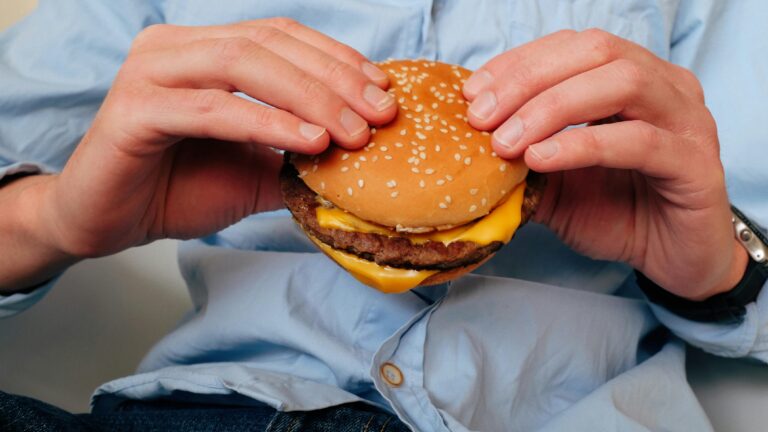Maintaining a healthy prostate is crucial for men’s overall well-being, particularly as they age. Diet plays a significant role in prostate health, and some foods can negatively impact its function. Understanding which foods to avoid is the first step toward safeguarding your prostate. Below, we explore the ten worst foods for prostate health and why they should be limited or eliminated from your diet.
- Processed Meats
- Red Meat
- Dairy Products
- Alcohol
- Caffeine
- Sugary Foods and Beverages
- Trans Fats
- Spicy Foods
- Salt
- Refined Carbohydrates
- Studies and Sources
- FAQs: Prostate Health
- Question: What are the early symptoms of prostate problems?
- Question: What foods are bad for prostate health?
- Question: Can prostate cancer be prevented through diet?
- Question: How often should men get their prostate checked?
- Question: What is benign prostatic hyperplasia (BPH)?
- Question: Can an enlarged prostate cause urinary problems?
- Question: How can I maintain good prostate health?
Processed Meats
Processed meats, including bacon, sausages, and cold cuts, are packed with sodium and preservatives like nitrates, which can be harmful to prostate health. These meats are often associated with increased inflammation in the body, which is detrimental to the prostate. Research suggests that a high intake of processed meats is linked to a higher risk of prostate cancer and other prostate-related issues. Additionally, the carcinogenic compounds formed during the processing and cooking of these meats can pose a threat to cellular integrity, potentially leading to cancerous changes.
Why You Should Avoid Processed Meats:
- High levels of nitrates and preservatives
- Encourages inflammation, which may harm the prostate
- Potential carcinogenic effects
Red Meat
While red meat can be a source of valuable protein and nutrients, excessive consumption is associated with a higher risk of prostate cancer. The problem largely arises from grilling or frying red meats, which leads to the formation of heterocyclic amines (HCAs) and polycyclic aromatic hydrocarbons (PAHs). These compounds are known to contribute to the development of cancer, including prostate cancer.
Why Red Meat Is Risky:
- Contains cancer-promoting compounds like HCAs and PAHs
- Excessive consumption is linked to an increased risk of prostate cancer
Dairy Products
Dairy products like milk, cheese, and butter contain high levels of saturated fats and hormones that can negatively affect prostate health. Studies have shown that diets high in dairy are associated with an increased risk of prostate cancer due to the promotion of insulin-like growth factor (IGF), which is known to encourage the growth of cancer cells.
Why Dairy Products Are Problematic:
- High in saturated fats, which promote inflammation
- IGF hormones can stimulate the growth of prostate cancer cells
Alcohol
Frequent alcohol consumption can increase the likelihood of developing prostate issues, including benign prostatic hyperplasia (BPH) and prostate cancer. Alcohol’s effects on the liver can influence hormone levels, particularly testosterone and estrogen, which play a role in prostate function. Excessive alcohol intake also contributes to inflammation and oxidative stress, which may damage prostate cells.
How Alcohol Impacts Prostate Health:
- Disrupts hormone balance, negatively affecting prostate health
- Increases inflammation and oxidative stress
Caffeine
While moderate consumption of caffeine is generally safe, excessive intake of caffeinated beverages such as coffee, tea, and energy drinks can exacerbate prostate symptoms, particularly in men who suffer from BPH. Caffeine acts as a diuretic, leading to increased urination, which can put strain on an already enlarged prostate. Furthermore, caffeine can increase anxiety and stress, both of which have been shown to worsen prostate-related symptoms.
Why You Should Limit Caffeine:
- Can worsen symptoms of BPH and urinary issues
- Acts as a diuretic, increasing the frequency of urination
Sugary Foods and Beverages
Consuming high amounts of sugar can have a detrimental effect on prostate health, as it promotes insulin resistance and inflammation. Foods high in sugar, including pastries, sodas, and candies, can lead to weight gain and obesity, which are risk factors for prostate cancer. Additionally, sugar encourages the growth of harmful bacteria in the urinary tract, potentially exacerbating prostate symptoms.
Why Sugar Harms the Prostate:
- Leads to insulin resistance and chronic inflammation
- Contributes to obesity, a known risk factor for prostate issues
Trans Fats
Trans fats, commonly found in fried foods, baked goods, and processed snacks, are known to cause inflammation and increase the risk of chronic diseases such as prostate cancer. Trans fats also negatively impact cholesterol levels, contributing to cardiovascular issues, which are often linked to poor prostate health.
Why Trans Fats Are Dangerous:
- Promote inflammation and cancer risk
- Harm cholesterol levels, indirectly affecting prostate health
Spicy Foods
Spicy foods, such as dishes that contain hot peppers or large amounts of spices, can irritate the bladder and prostate, especially in men who suffer from BPH or prostatitis. While the occasional spicy meal is unlikely to cause harm, frequent consumption of spicy foods can worsen urinary symptoms, such as urgency and frequency.
Why Spicy Foods Can Be Harmful:
- Irritate the bladder and prostate, worsening symptoms of BPH
- Can increase urinary urgency and frequency
Salt
A diet high in sodium is associated with a number of health concerns, including high blood pressure and prostate problems. Men with BPH are particularly vulnerable to the effects of salt, as it can lead to increased fluid retention and worsen urinary symptoms. Reducing sodium intake can help alleviate pressure on the prostate and improve overall urinary function.
How Salt Affects the Prostate:
- Worsens fluid retention and urinary symptoms
- Linked to increased blood pressure, indirectly affecting prostate health
Refined Carbohydrates
Refined carbohydrates, such as those found in white bread, pastries, and processed snacks, are quickly broken down into glucose, causing spikes in blood sugar and insulin. These spikes contribute to chronic inflammation, which can negatively impact the prostate. Furthermore, diets high in refined carbohydrates are often associated with obesity and metabolic syndrome, both of which are risk factors for prostate issues.
Why Refined Carbs Are Problematic:
- Cause blood sugar spikes that lead to inflammation
- Contribute to obesity and metabolic syndrome, increasing the risk of prostate issues

Conclusion
When it comes to protecting your prostate, every bite counts. The foods we consume daily can either nourish or harm this vital gland. By avoiding these ten prostate-unfriendly foods, you take a powerful step toward long-term health and vitality. Small changes in your diet today could make all the difference tomorrow—reducing your risk of prostate problems, improving your quality of life, and helping you stay strong and active for years to come.
Your prostate deserves the best. Make the choice to prioritize your health, and start by rethinking what’s on your plate.
Erectile Dysfunction After Prostate Surgery: Comprehensive Guide to Understanding and Managing ED
Studies and Sources
- Processed Meats and Prostate Cancer Risk:
- Study: “Consumption of Processed Meat and Risk of Prostate Cancer: A Meta-Analysis”
- Link: https://www.ncbi.nlm.nih.gov/pmc/articles/PMC5828587/
- Red Meat and Cancer-Causing Compounds:
- Study: “Heterocyclic amines in cooked meats and the risk of prostate cancer”
- Link: https://www.cancer.gov/about-cancer/causes-prevention/risk/diet/cooked-meats-fact-sheet
- Dairy Products and Prostate Health:
- Study: “Dairy products, calcium, and prostate cancer risk: a systematic review”
- Link: https://pubmed.ncbi.nlm.nih.gov/17229877/
- Alcohol and Prostate Cancer:
- Study: “Alcohol intake and prostate cancer risk: a meta-analysis”
- Link: https://pubmed.ncbi.nlm.nih.gov/26705593/
- Caffeine and BPH Symptoms:
- Study: “Caffeine intake and risk of benign prostatic hyperplasia”
- Link: https://www.ncbi.nlm.nih.gov/pmc/articles/PMC3874067/
- Sugar and Prostate Health:
- Study: “High blood sugar and prostate cancer risk”
- Link: https://www.ncbi.nlm.nih.gov/pmc/articles/PMC4677786/
- Trans Fats and Prostate Cancer:
- Study: “Dietary intake of trans-fatty acids and prostate cancer risk”
- Link: https://pubmed.ncbi.nlm.nih.gov/15966385/
- Spicy Foods and Prostate Symptoms:
- Study: “Effects of spicy food consumption on lower urinary tract symptoms”
- Link: https://pubmed.ncbi.nlm.nih.gov/24018315/
- Salt and Prostate Health:
- Study: “The impact of dietary sodium on prostate function”
- Link: https://www.ncbi.nlm.nih.gov/pmc/articles/PMC4470489/
- Refined Carbohydrates and Prostate Cancer:
- Study: “Refined carbohydrate intake and prostate cancer”
- Link: https://pubmed.ncbi.nlm.nih.gov/21270306/
Testosterone and Prostate Health: Dispelling Myths and Understanding Risks
FAQs: Prostate Health
Question: What are the early symptoms of prostate problems?
Early symptoms of prostate problems can include frequent urination, especially at night, difficulty starting urination, a weak urine stream, and feeling that the bladder is not fully empty. In some cases, painful ejaculation or blood in the urine may occur.
Question: What foods are bad for prostate health?
Foods that can negatively affect prostate health include processed meats, red meat, dairy products, alcohol, sugary foods, and foods high in trans fats. These foods can promote inflammation, which may increase the risk of prostate issues.
Question: Can prostate cancer be prevented through diet?
While diet alone cannot prevent prostate cancer, eating a balanced diet rich in fruits, vegetables, and healthy fats can reduce the risk. Avoiding processed foods, red meat, and excessive dairy intake may also help protect the prostate.
Question: How often should men get their prostate checked?
Men should begin discussing prostate screening with their healthcare provider around age 50. Those with a family history of prostate cancer or other risk factors may need to start screenings earlier, usually around age 40-45.
Question: What is benign prostatic hyperplasia (BPH)?
Benign prostatic hyperplasia (BPH) is the non-cancerous enlargement of the prostate gland, commonly seen in men as they age. BPH can lead to symptoms such as frequent urination, difficulty emptying the bladder, and a weak urine stream.
Question: Can an enlarged prostate cause urinary problems?
Yes, an **enlarged prostate** can put pressure on the urethra, leading to **urinary problems** such as difficulty starting or stopping urination, weak flow, frequent urination, or a feeling of incomplete bladder emptying.
Question: How can I maintain good prostate health?
To maintain good prostate health, it’s important to follow a diet rich in fruits, vegetables, whole grains, and healthy fats. Regular exercise, staying hydrated, limiting alcohol consumption, and getting regular prostate exams can also support prostate health.
Testosterone and Prostate Cancer: Understanding the Controversies and Realities





